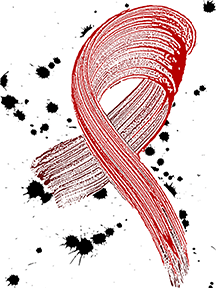By Andrew Huff
April marks National Poetry Month in the United States, celebrated annually since 1996. Two prominent gay poets and members of Phi Beta Kappa, Michael Lassell (1947-) and Paul Monette (1945-1995), deserve recognition for their contributions to the genre. Their distinct, though intersecting, life histories contain a poeticism all their own.
The phrase “gay poet,” as Christopher Hennessy writes in Our Deep Gossip: Conversations with Gay Writers on Poetry and Desire, is not constraining, but rather framing: “The world shines through each man’s work and life as if through a different stained glass window,” even while both are “stained glass.” Lassell and Monette’s work concerning the AIDS epidemic has remained especially illuminating.
Lassell has built a strong career in written and performance arts since graduating Phi Beta Kappa from Colgate University in 1969. John H. Pearson, in his biography of Lassell for Emmanuel S. Nelson’s edited volume, Contemporary Gay American Poets and Playwrights: An A-to-Z Guide, notes that the poet earned an MFA from Yale Drama School in 1976. He eventually chose to pursue a career in publishing. Between 1983 and 1992, he moved between the role of managing editor at LA Weekly, LA Style Magazine, and Interview Magazine. Lassell then worked as the features director for the interior design magazine Metropolitan Home.
Pearson indicates that Lassell’s first book of poetry, Poems for Lost and Un-Lost Boys (1985), won the 1985 Amelia Chapbook Award while his second, Decade Dance (1990), was a finalist for the Gregory Kolovakos Award for Writing About AIDS; it also won the Lambda Literary Award.
According to the Lambda Literary Foundation, Paul Monette (ΦBK, Yale, 1967) was honored at the first Lambda Literary Awards reception in 1989 for his book Borrowed Time: An AIDS Memoir (1988) (“A Brief History of LLF”). The book chronicles the author tending to his partner Roger Horwitz in the last two years of his life before dying of AIDS-related complications in 1985, the year Lassell earned the Amelia Chapbook Award.
According to the National Book Foundation, Monette’s Borrowed Time was a National Book Award finalist in 1988 while his autobiography, Becoming a Man: Half a Life Story, won the Award for non-fiction in 1992. His works of memoir have garnered more attention than his poetry, though Monette wrote in both forms. In fact, according to the Yale AIDS Memorial Project, the undergraduate English major even served as the Senior Class Poet.
AIDS proved a deep source of artistic vision for both Lassell and Monette. The latter is even referred to as “the bard of AIDS” in Monica B. Pearl’s AIDS Literature and Gay Identity: The Literature of Loss.
Lassell, according to Pearson, has been praised for explicitly confronting AIDS and the politics around it. In one famed piece, “Piss Jesse, or Silence = Death,” he offers a sharp critique of US Senator Jesse Helms for his perpetuation of stigma against people living with AIDS.
The two poets also intersected thematically. Pearson writes that one of Lassell’s most anthologized poems is “How to Watch Your Brother Die” (1985), written about a heterosexual man arriving at the deathbed of his AIDS-stricken gay brother.
Meanwhile, Monette’s novel Afterlife (1990) tells the story of a group of gay men who meet one another in the hospital where each of their lovers is dying of AIDS. His next book, Halfway Home (1991), offers the story of reconnection between a man and his brother, who has AIDS.
Monette, who wrote thirteen books over the course of his life, died of AIDS-related complications in February 1995, according to his obituary in The New York Times (“Paul Monette, 49, Who Wrote of AIDS, Dies”). The commemoration of National Poetry Month began one year later.
As poets, Michael Lassell and Paul Monette have accomplished an interdisciplinary translation of illness by mediating medical trauma through poetry. They have reconfigured AIDS from a disease into a source of artistry and in doing so reveal that people affected by AIDS are more than just patients.
To revisit the language of Hennessey’s metaphor, even as the stained glass portrays a somber scene, it still conveys a certain awe. With Lassell and Monette, readers find beauty in the sorrow.
Andrew Huff is a senior at Goucher College majoring in Political Science. Goucher College is home to the Beta of the Maryland Chapter of Phi Beta Kappa.




